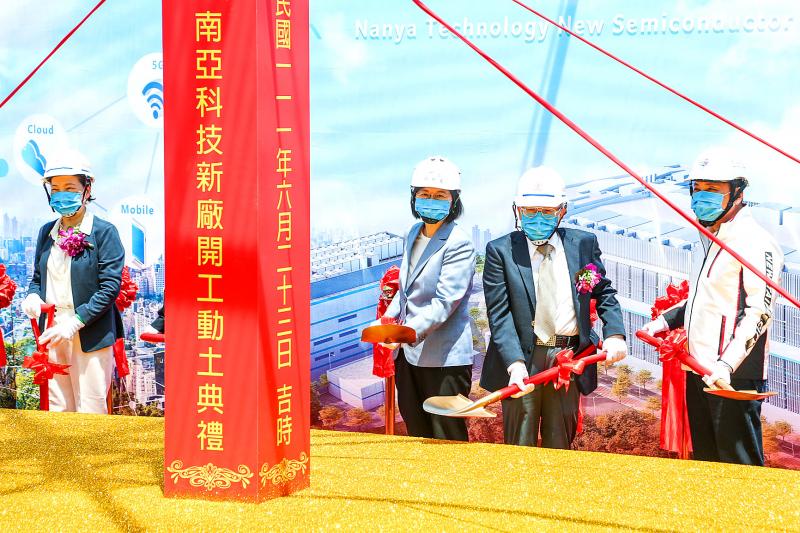DRAM chipmaker Nanya Technology Corp (南亞科技) yesterday said it expects a mild decline in revenue this year as mounting inflation is depressing spending on consumer electronics, which has led to an inventory correction from PC and smartphone companies.
The correction is expected to extend into the next quarter and is likely to last through the fourth quarter, defying the traditional business pattern for the chip industry.
The third quarter is usually a peak season, Nanya said.

Photo: CNA
“There are lots of black swan events this year. Mounting inflation, in particular, has significantly dampened consumer confidence and their purchasing power,” Nanya president Lee Pei-ing (李培瑛) told reporters on the sidelines of a groundbreaking ceremony for the company’s new factory in New Taipei City’s Taishan District (泰山).
“Nanya Technology has done quite a good job in the first half of this year. We hope [revenue] would drop only slightly for the whole year of this year, compared with last year,” Lee said.
Aside from PCs and smartphones, the adverse effect of inflation is likely to spread to server DRAM demand, Lee said.
Server buyers might start to tighten their capital expenditures in the final quarter of the year, he added.
Nanya’s revenue inched up 0.04 percent to NT$32.74 billion (US$1.1 billion) in the first five months of this year, after posting its lowest monthly revenue last month as an uneven supply of key components worsened due to China’s lockdowns.
Despite the slowdown, Nanya does not plan to scale back this year’s planned capital spending of NT$28.4 billion, but some payments might be deferred to next year due to delays in equipment delivery amid a shortage of key components, Lee said.
The chipmaker plans to adjust capacity allocations to cope with the short-term shocks, as it believes the DRAM industry would grow in the long term, given its vital status in the digital transformation, Lee said.
The company serves more than 800 customers with diversified products, he said.
PC DRAM accounts for only about 20 percent of the company’s total revenue, he said.
The company plans to invest NT$300 billion in the new 12-inch fab. That would add 45,000 12-inch wafers to the firm’s monthly capacity of 70,000 wafers, helping it to capture new growth opportunities.
The chipmaker expects the fab to start commercial shipments in 2025 rather than in 2024, with a monthly capacity of 15,000 wafers in the first phase.
The company plans to deploy 10-nanometer process technology, developed entirely by the chipmaker, he said.
It also plans to use extreme ultraviolet lithography, or EUV, tools when the chipmaker starts producing chips using fourth-generation 10-nanometer technology, it said.

NEW IDENTITY: Known for its software, India has expanded into hardware, with its semiconductor industry growing from US$38bn in 2023 to US$45bn to US$50bn India on Saturday inaugurated its first semiconductor assembly and test facility, a milestone in the government’s push to reduce dependence on foreign chipmakers and stake a claim in a sector dominated by China. Indian Prime Minister Narendra Modi opened US firm Micron Technology Inc’s semiconductor assembly, test and packaging unit in his home state of Gujarat, hailing the “dawn of a new era” for India’s technology ambitions. “When young Indians look back in the future, they will see this decade as the turning point in our tech future,” Modi told the event, which was broadcast on his YouTube channel. The plant would convert

‘SEISMIC SHIFT’: The researcher forecast there would be about 1.1 billion mobile shipments this year, down from 1.26 billion the prior year and erasing years of gains The global smartphone market is expected to contract 12.9 percent this year due to the unprecedented memorychip shortage, marking “a crisis like no other,” researcher International Data Corp (IDC) said. The new forecast, a dramatic revision down from earlier estimates, gives the latest accounting of the ongoing memory crunch that is affecting every corner of the electronics industry. The demand for advanced memory to power artificial intelligence (AI) tasks has drained global supply until well into next year and jeopardizes the business model of many smartphone makers. IDC forecast about 1.1 billion mobile shipments this year, down from 1.26 billion the prior

People stand in a Pokemon store in Tokyo on Thursday. One of the world highest-grossing franchises is celebrated its 30th anniversary yesterday.

Zimbabwe’s ban on raw lithium exports is forcing Chinese miners to rethink their strategy, speeding up plans to process the metal locally instead of shipping it to China’s vast rechargeable battery industry. The country is Africa’s largest lithium producer and has one of the world’s largest reserves, according to the US Geological Survey (USGS). Zimbabwe already banned the export of lithium ore in 2022 and last year announced it would halt exports of lithium concentrates from January next year. However, on Wednesday it imposed the ban with immediate effect, leaving unclear what the lithium mining sector would do in the